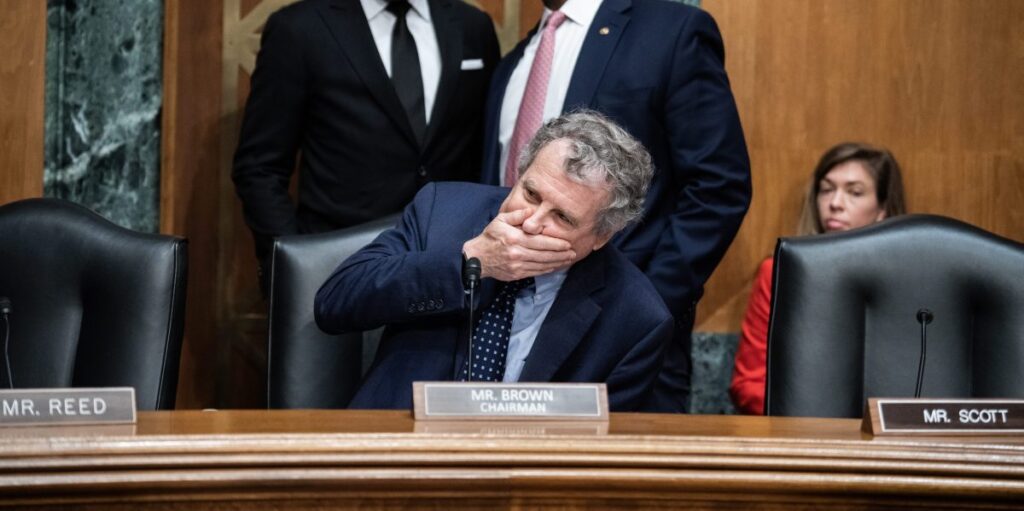Wealthy Crypto Investors Could Help Shift Control of Senate to GOP. Here’s What’s on Their Agenda.

After two elections where he bucked Ohio’s rightward trend, Democratic Sen. Sherrod Brown is clinging to the narrowest of polling leads. If he loses to unpopular car salesman Bernie Moreno next month, he might have crypto to blame.
Cryptocurrency companies are pouring tens of millions of dollars into the race through a super PAC in response to Brown’s scathing criticism of the industry as Senate Banking Committee chair.
Their leading role in the race shows how much money — no matter the “coin” — talks.
Crypto sat in the political doghouse after the collapse of Sam Bankman-Fried’s FTX fraud two years ago, but it drew broad bipartisan support for its top legislative priority this May as it showered money on congressional races.
“Really their only avenue here to continue their scams is to get enough politicians to change the law.”
If crypto can take down Brown next month, critics warn, it could lead to more success for an agenda that includes neutering the Securities and Exchange Commission and opening the door for more traditional banks to hold crypto.
“They’re losing in the courts, they’re losing in the court of public opinion, so really their only avenue here to continue their scams is to get enough politicians to change the law,” said Dennis Kelleher, the CEO of financial reform nonprofit Better Markets. “The key to that is taking out anybody who opposes them.”
Mad Money
Operating through a cluster of blandly named super PACs, the crypto industry had made nearly half of all corporate donations in this year’s elections as of August. A single pro-crypto super PAC, Fairshake, has raised more than $200 million and spent more than $132 million this cycle.
Fairshake and its affiliates have spent millions backing Democratic Senate candidates Reps. Ruben Gallego in Arizona and Elissa Slotkin in Michigan, along with House candidates on both sides of the aisle.
Nowhere has crypto’s influence been more obvious than Ohio. In the last election cycle, a super PAC bankrolled by Bankman-Fried backed now-Rep. Shontel Brown, D-Ohio, over progressive Nina Turner.
This year, crypto is coming even harder into the state. A Fairshake affiliate, Defend American Jobs, has spent more than $38 million on ads boosting Moreno and blasting Brown, according to a recent Washington Post analysis.
A Fairshake spokesperson did not return a request for comment, but the reasons for the attack ads are clear enough. Well before Bankman-Fried’s downfall, Brown was a vocal critic of cryptocurrency.
“Stablecoins and crypto markets aren’t actually an alternative to our banking system,” he said in December 2021. “They’re a mirror of the same broken system –– with even less accountability, and no rules at all.”
The super PAC’s spending on a race that could hand control of the Senate to the GOP has made some Democratic industry leaders uncomfortable. A spokesperson for one of the PAC’s top donors, the crypto exchange Coinbase, said the PAC’s spending decisions are made independently, a claim echoed by Andreessen Horowitz, a venture capital firm that has invested billions in the crypto industry.
Coinbase CEO Brian Armstrong said in a blog post that the company was making its donations in an effort to get “regulatory clarity.”
In June, Armstrong said, “Crypto voters won’t be taken seriously until we send a clear message to political candidates that it is bad politics to be anti-crypto.”
Taming the SEC
Yet it isn’t just “clarity” that Armstrong and other industry players want. They also want specific legislation. “Getting the wrong kind of regulation is worse than none at all,” Armstrong said last month.
Top of the list is legislation called the Financial Innovation and Technology for the 21st Century Act, or FIT 21, which would reclassify many kinds of crypto as commodities rather than securities.
The obscure-sounding shift has broad implications. Observers generally consider the rules for commodities — items like corn and wheat — to be looser than those for securities such as stocks and bonds.
“The CFTC was set up to regulate corn futures.”
Just as importantly, crypto critics say, would be a corresponding shift in oversight. Under the congressional legislation, crypto would shed the SEC for the Commodity Futures Trading Commission, a body with less resources and a leaner regulatory staff.
“The CFTC was set up to regulate corn futures,” said Mark Hays, a senior policy analyst with Americans for Financial Reform and Demand Progress. “The people they’re looking at are sophisticated hedge funds or ag traders, they are not set up to protect your cousin or your grandma logging onto their phone.”
SEC Chair Gary Gensler, who has emerged as a crypto industry foil, warned of the bill’s consequences in a statement after it passed the House with bipartisan support in May. Scammers could label themselves crypto companies in order to evade government oversight, he said.
Gensler said, “The crypto industry’s record of failures, frauds, and bankruptcies is not because we don’t have rules or because the rules are unclear. It’s because many players in the crypto industry don’t play by the rules.”
Opening Up the Banks
So far, the crypto industry’s favorite piece of legislation has not advanced in the Senate, although Majority Leader Chuck Schumer, D-N.Y., recently made supportive-sounding comments.
Gensler also warned of the potential for larger contamination of the U.S. capital market. The issue arose in 2022, when SEC staffers tried to curb the danger with guidance advising financial institutions like banks to treat crypto as a liability rather than an asset on their balance sheets.
The SEC’s thinking was that crypto is too vulnerable to theft, fraud, or lost wallet keys, but the crypto industry and bankers cried foul.
Stand With Crypto, an industry advocacy group, said the guidance “disincentivizes banks from offering digital asset custody at scale and limits banks’ ability to develop safe, innovative use cases for blockchain technology.”
While the guidance was nonbinding, for banks that decided to follow through, it meant that holding crypto for customers would require them to increase other holdings.
Congress passed legislation overriding the guidance, only to be vetoed by President Joe Biden in June. For now, the guidance remains in place. Yet the crypto industry still harbors its larger ambition of making it easier for traditional financial institutions to hold crypto.
Hays, the Americans for Financial Reform policy analyst, said, “They also want some of the other non-bank actors that provide crypto custody to be in the green.”
“Stable” Coins
Sometimes lost in the fallout from the Bankman-Fried saga is the story of an earlier crash involving a so-called stablecoin, TerraUSD, which was supposed to maintain a one-to-one peg with the dollar.
In short, it didn’t. Investors who thought they were getting into crypto in the safest way possible had their savings wiped out.
“A stablecoin is really nothing more than a crypto money market fund, with all the risks and dangers of a money market fund.”
TerraUSD was an “algorithmic” stablecoin, meaning that it was not backed by actual assets. One of the industry’s best hopes in Congress is to get legislation passed authorizing stablecoins that are backed by concrete assets.
Rep. Maxine Waters, D-Calif., the ranking member of the House Financial Services Committee and a frequent crypto skeptic, floated the idea last month of reaching a “grand bargain” with Republicans during the lame-duck Congress after the election.
Although stablecoins seem to have more legislative legs than other crypto proposals, skeptics like Kelleher, of Better Markets, are wary. He likened them to money market funds, which had to be saved from collapse by the Federal Reserve in 2008 and 2020.
“A stablecoin is really nothing more than a crypto money market fund, with all the risks and dangers of a money market fund,” he said. “Except it has even more, because it’s a crypto product that is not only unregulated, but because it’s also untransparent.”
Editor’s Note: In September 2022, The Intercept received $500,000 from Sam Bankman-Fried’s foundation, Building a Stronger Future, as part of a $4 million grant to fund our pandemic prevention and biosafety coverage. That grant has been suspended. In keeping with our general practice, The Intercept disclosed the funding in subsequent reporting on Bankman-Fried’s political activities.
Source link
#Crypto #Billionaires #Flip #Senate #GOP #Heres





